AARP Hearing Center


When my kids were little, if one of them said something like, “I told you I needed a carrot costume for school tomorrow,” I’d respond, “Did you see me write it down? If you didn’t see me write it down, it’s the same thing as not telling me. Go check the carrot costume drawer. See if there’s one in there.”
I’ve always forgotten stuff occasionally. In elementary school, I used to get in trouble for forgetting my sneakers for P.E. As punishment, the teacher made me sit on the retractable benches in the cafeteria/gym. I remember thinking, If I forget one more time, they’re gonna fold the bench back into the wall with me on it.
But the day after the appearance of your first couple of gray hairs — I’m 64 now — any time you forget something, people start saying, “You’re having a senior moment.” Really? Then how do you explain all of the times I forgot stuff at 12, 17, 31 and 42 years old? There’s not a creature on earth more forgetful than a teenage boy. Have we forgotten that?
I’m no brain scientist, as far as I can remember, but I believe my inability to remember is stress-related. I’ll tell you what doesn’t improve your memory every time you forget something — worrying that it’s some kind of cognitive decline.
A while back, the University of Michigan's National Poll on Healthy Aging found that around half (48 percent) of people between age 50 and 64 were convinced they’d get dementia in their lifetime. But in reality, just 10 percent of Americans over 65 have some form of dementia. That means 40 percent of us are worrying about nothing. Nothing!
When my house was filled with kids and pets, and my nonlinear work as a stand-up comic and writer came with a wagonload of stress, I’d tape my to-do list to the front of my shirt. Anyone who saw it couldn’t help reading it.
“Did you buy a new drain stopper?” they’d ask.
“Oh, my gosh,” I’d respond. “I’ve gotta get to the hardware store!”





























































You Might Also Like
Keeping Your Memory Sharp
From checking hormone levels and your hearing to how to nourish the brain, we have tips to help your brain health
Groundbreaking Alzheimer’s Research
Sanjay Gupta, M.D., shares promising outcomes he witnessed while filming ‘The Last Alzheimer’s Patient’
How to Build Healthy Habits
From working backwards and playing games to habit stacking and celebrating micro wins, here is practical advice
Recommended for You